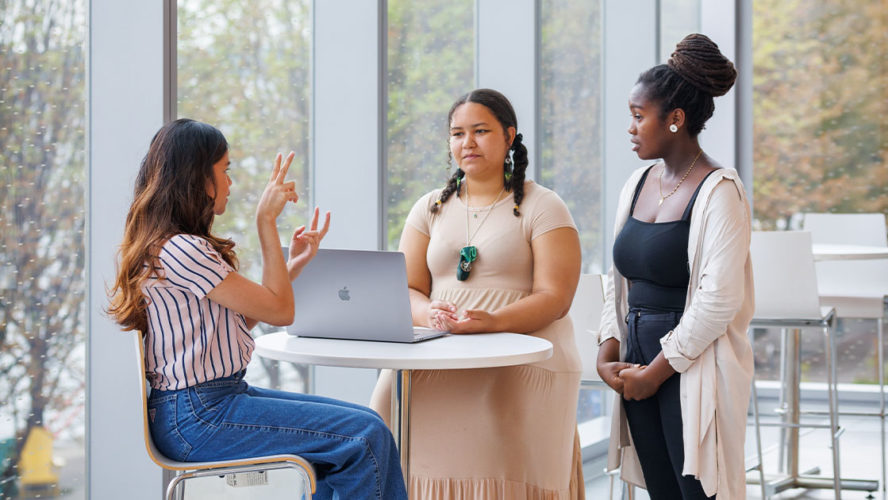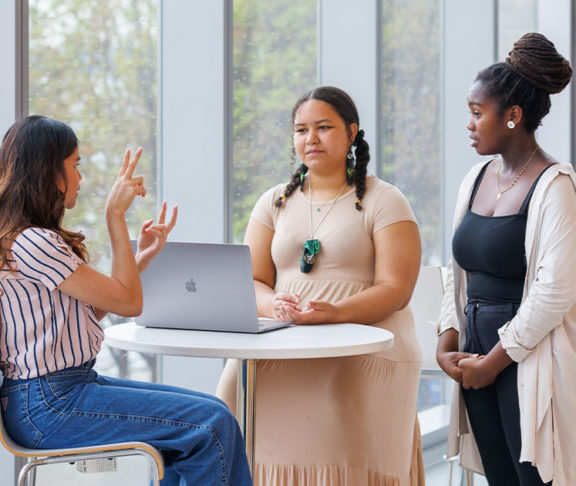How George Brown College is creating spaces to meet the diverse needs of its learners.
Education should be accessible. At George Brown College, we’re providing innovative programming for the Deaf community.
Facilitating students learning in their own language
We’re proud of our Deaf Learn Now (DLN) program, which celebrates its 10th anniversary this year. DLN is the first online literacy program in the world for Deaf and hard-of-hearing adults. Situated within the college’s School of Work and College Preparation and funded by Employment Ontario, this tuition-free program reaches Deaf students across the province of Ontario. We have a number of Deaf employees and faculty who communicate in ASL and English. For many Deaf students, this may be the first time they’re in an academic setting that doesn’t require an interpreter.
Shirin Dossani, a Deaf Learn Now student, appreciated being able to find courses in ASL. “I took DLN’s Food Safety Course last year and loved it… I was so happy to find a course in ASL and English, expanding my vocabulary and knowledge. I’m eager to take more courses.”
The Deaf Learn Now program also offers its students access to a Deaf counsellor, Lucy Ross. Students can book one-on-one appointments with Ross or attend one of the many workshops she hosts throughout the year. These workshops have been particularly beneficial during the pandemic to help explain COVID-19-related information and foster connections amongst our Deaf student community. The college’s Deaf and Hard-of-Hearing Services department also offers in-class accommodations such as ASL interpretation, Intervenor services, and notetaking for Deaf, deafblind, and hard-of-hearing students attending any program at the college.
Matt Foran, Manager of Academic Upgrading Programs at George Brown, oversees the Deaf Learn Now program and is a strong advocate for accessibility and inclusion. Foran stresses, “It’s important for colleges and the Ministry to recognize that accessibility is not a luxury. It’s truly what’s required of us to make education pathways happen.”
It’s important for colleges and the Ministry to recognize that accessibility is not a luxury. It’s truly what’s required of us to make education pathways happen.
Celebrating success for the college and our students
The Ministry of Labour, Immigration, Training and Skills Development nominated the DLN team for the 2022 Council of Federation Literacy Award. These awards recognize outstanding achievement, innovative practice, and excellence in literacy. Awarded annually in each province and territory, they celebrate educators, volunteers, learners, community organizations, and businesses. All of us at George Brown were thrilled when, on September 8 (International Literacy Day), the DLN team was chosen as the recipient of the award for outstanding achievement and excellence in literacy. Receiving this recognition is wonderful, but the real reward comes from seeing our Deaf and hard-of-hearing students succeed and find a safe place that addresses, celebrates, and supports their diverse needs.

Academic programs that are unique in Ontario
While Deaf Learn Now focuses on teaching Deaf and hard-of-hearing learners, George Brown College’s School of Deaf and Deafblind Studies offers programming to train students in communication with, to and from members of the Deaf and deafblind community. Our American Sign Language and Deaf Studies program, unique in Ontario, teaches students basic ASL language skills and provides an orientation to Deaf culture. Our Deafblind & Intervenor Studies Ontario College certificate program trains students to work with people who have combined vision and hearing loss, including those with congenital and acquired deafblindness. George Brown College was the first college in Canada to offer this kind of certificate program. We were also the first college in Canada to launch an Honours Bachelor of Interpretation (American Sign Language – English) — a degree program that educates students to work as American Sign Language – English interpreters. Graduates of this program foster communication in a broad range of sectors, including medical, financial, health care, and education.
Building access, equity and inclusion
At George Brown College, we know that our programs are helping to contribute to access, equity, and inclusion in education for all students, including the Deaf and deafblind communities, and we’re proud of that. But we also recognize that there’s more work to be done. Post-secondary institutions are uniquely positioned to shape accessible education in Canada. It’s our collective responsibility to ensure safe spaces are created, barriers are eliminated, and that accessibility is no longer a luxury but a priority.
While George Brown has been providing programs and services to the Deaf community since 1972, we also provide other tuition-free programming to support other under-represented groups. We offer a number of programs specifically designed for individuals living with complex or chronic mental health concerns or addictions. For those thinking about college but aren’t sure where to start, we provide “CHOICES” — a one-week program that helps students identify meaningful individual personal and career goals. Our Academic Upgrading program offers two streams — one for mature students who need to upgrade their English, math, computer, or science skills, and a second stream specifically designed to support Deaf and hard-of-hearing adults who need to upgrade their English, math, and ASL skills to support further post-secondary study or career development. And for any mature student in Ontario who has applied to a college program and needs to have their English or math skills assessed, we offer a three-week Mature Students Assessment Preparation (MSAP) to help them succeed with the assessment.



